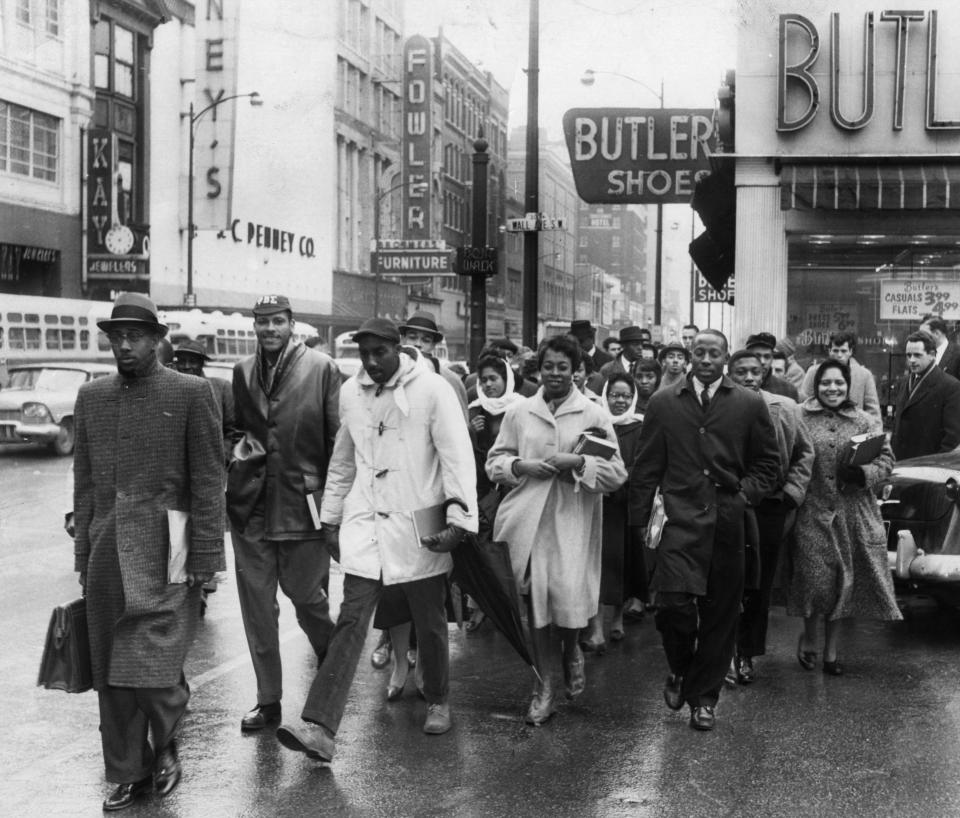As a student and a candidate, I answered Bob Booker's call to action | Opinion
- Oops!Something went wrong.Please try again later.
- Oops!Something went wrong.Please try again later.
In the spring of 1960, as a senior at Austin High School, I had my earliest memory of Dr. Bob Booker. He was an alumnus. The principal, Mr. O.T. Hogue, had allowed Bob to speak to the students in a general assembly. Bob talked about the lunch counter sit-in demonstrations that were happening in the South, demanding that Black customers be treated no differently than white customers.
While having heard about Bob Booker before that event, I had never heard him speak. In his beautiful baritone voice, he laid out the stakes of the sit-in movement that began in Greensboro, North Carolina. By spring, demonstrations had spread to Nashville. Students at Knoxville College, historically Black college or university, were paying attention to what North Carolina A&T, Tennessee State and Fisk, all HBCUs, were doing to desegregate downtown lunch counters in their respective cities.
We paid rapt attention to Bob’s message. Knoxville College students had already staged a walk-through of downtown stores in Knoxville to express their dissatisfaction with their segregated or nonexistent food service operated under old Jim Crow laws. These stores welcomed Black dollars in every commercial activity they offered but declined to serve those same customers at their lunch counters. Building on the Montgomery bus boycott led by Dr. Martin Luther King Jr., Bob laid out the stakes of lifting the yoke of second-class citizenship; his message was a call to action. He led, and we followed.
Bob was the first Black Knoxvillian elected to the state legislature
Bob was elected to the Tennessee House of Representatives in 1966, becoming the first Black person from Knoxville to achieve this historic milestone. It was a proud moment for Black Knoxvillians.
Two years later, as he prepared for reelection, Bob urged me to run for the legislature from a bordering district. Having been interested in politics from age 6, it was not a difficult decision. After winning our respective primaries, we ran our campaigns from the same office, located on McCalla Avenue, now Martin Luther King Jr. Avenue, adjacent to the old site of WJBE Radio. It was also the same year as the presidential election.
Sen. Hubert Humphrey, the Democratic presidential nominee, came to Knoxville for a campaign event at the Andrew Johnson Hotel. Naturally, Bob and I were in attendance. So was Sen. Hub Walters. A photo was taken of us with Humphrey in between. It so happened that Walters was passing in the background and was inadvertently included in the photo. We used that picture in a joint campaign poster with the message, Vote for Humphrey, Booker, and Robinson.
Our close supporters gathered at Bob's home on the night of the November 1960 election. One of the items on the ballot was a city charter amendment that aimed to establish districts for the City Council and the Board of Education. Racism had made it impossible for a Black person in Knoxville to be elected to either body for decades. The leaders of our city proposed a change to the election process to address this issue. While the voters reelected Bob to the legislature, they also approved the charter amendment. Unfortunately, I lost the election in a district that was 70% white. However, that November night in Bob's living room, we decided I would run for City Council the following year.

Chilhowee Park and the Eighth of August
During its glory years, Chilhowee Park was Knoxville’s version of Dollywood. Access was restricted to Black people for only one day each year ‒ the Eighth of August. This date in 1863 commemorates when Andrew Johnson freed his enslaved people. For Black people, it was our Fourth of July. Black people, especially children and teenagers, would save their coins all year for their holiday at the park. In the mid-1940s, Bob was one of them, washing pots at a restaurant on Magnolia Avenue to save money to spend on the Eighth.
Before Jonas Salk's vaccine was introduced, the polio virus was widespread. Nearly every household had a family member or acquaintance affected by the disease. During that time, Knoxville had several polio cases, and Bob's mother prohibited him from going to the park on the Eighth despite him having saved his meager wages. Bob was disappointed and felt like his Christmas had been canceled. In 1948, Chilhowee Park began to allow Black patrons entry every Thursday.
Our conversations were sometimes long. My memories will be longer.
Dr. Theotis Robinson Jr. is a freelance writer, former Knoxville City Council member and retired vice president of equity and diversity at the University of Tennessee. He may be reached at thewriteone7@comcast.net.
This article originally appeared on Knoxville News Sentinel: Opinion: As a student, I answered Bob Booker's call to action

